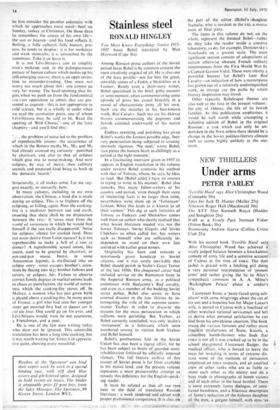Stainless steel
RONALD HINGLEY
You Must Know Everything: Stories 1915- 1937 Isaac Babel translated by Max Hayward (Cape 36s) Among Russian prose authors of the Soviet period Isaac Babel is by common consent the most creatively original of all. He is also one of the least prolific—not for him the great, unwieldy tomes of a Fedin, a Sholokhov or a Leonov. Barely even a short-story writer, Babel specialised in the brief, pithy memoir or semi-memoir, often commemorating some episode of gross but casual brutality in a mood of characteristic irony all his own. Such are the sketches in his best-known work, Red Cavalry. Such too are his Odessa Stories commemorating the pogroms and Jewish criminal underworld of his native city.
Endless rewriting and polishing has given Babel's works the keenest possible edge, their very punctuation being subjected to scrutiny intensely rigorous. `No steel,' wrote Babel, 'can pierce the human heart so chillingly as a period at the right moment.'
In a fascinating interview given in 1937 (it appears in English translation in the volume under review) Babel contrasts his method with that of Tolstoy, whom, he says, he likes to read. 'But [Babel adds] 1 have no interest in trying to write in his manner.' Babel also remarks that many fellow-writers of his country and period, 'even though their store of interesting facts is no larger than mine, nevertheless write them up in "Tolstoyan" fashion. What this leads to is known to all their victims.' This dig at such imitators of Tolstoy as Fadeyev and Sholokhov comes well from an author who clearly realised that what Soviet literature needed was not the Soviet Tolstoys, Soviet Gogols and Soviet Chekhovs so often called for, but writers such as himself who are sufficiently in- dependent to stand on their own feet unlinked with earlier great names.
Originality has been and remains a notoriously grave handicap to Soviet citizens, and it was surely inevitable that Babel should perish in Stalin's Great Terror of the late 1930s. His chequered career had included service on the Rumanian front in the Imperial Russian army, as a political commissar with Budyonny's Red cavalry, and even as a member of the budding Soviet secret police. Babel also seems to have courted disaster in the late 'thirties by in- terrogating the wife of the supreme terror- master Yezhov in order to discover the reasons for the mass persecution in which millions were perishing. But Yezhov, as Babel correctly concluded, was only Stalin's `instrument' in a holocaust which soon numbered among 'its victims both Yezhov and Babel himself.
Babel's posthumous fate in the Soviet Union has also. been a zigzag affair, for he, has been subject to bouts of guarded semi- rehabilitation followed by officially imposed silences. The full literary archive of this master of Soviet prose is far from available in his native land, and the present volume represents a most praiseworthy attempt to remedy this deficiency for the English-speak- ing reader.
It must be saluted as that all too rare item in the field of translated Russian literature: a work rendered and edited with proper professional competence. It is also, on the part of the editor (Babel's daughter Nathalie, who is resident in the us), a monu- ment of filial piety.
The items in this volume do not, on the whole, represent the finished Babel—rather do they take- the reader inside a creative laboratory, as do, for example, Dostoievsky's Notebooks on a greater scale. The most significant section consists of adaptations of certain otherwise obscure French military reminiscences from the First World War by a Captain Gaston Vidal. These were clearly a powerful booster for Babel's later Red Cavalry—an indication of how a masterpiece has grown out of a relatively undistinguished work, so strange are the paths by which literary inspiration may travel.
Other typically Babelesque themes are also well to the fore in the present volume: the city of Odessa, the life of its Jewish families. As this publication emphasises, it would be well worth while attempting a definitive edition of Babel in the original Russian: a task which can only be un- dertaken in the West unless there should be a change in the Soviet politico-literary climate such as seems highly unlikely at the mo- ment.






























 Previous page
Previous page